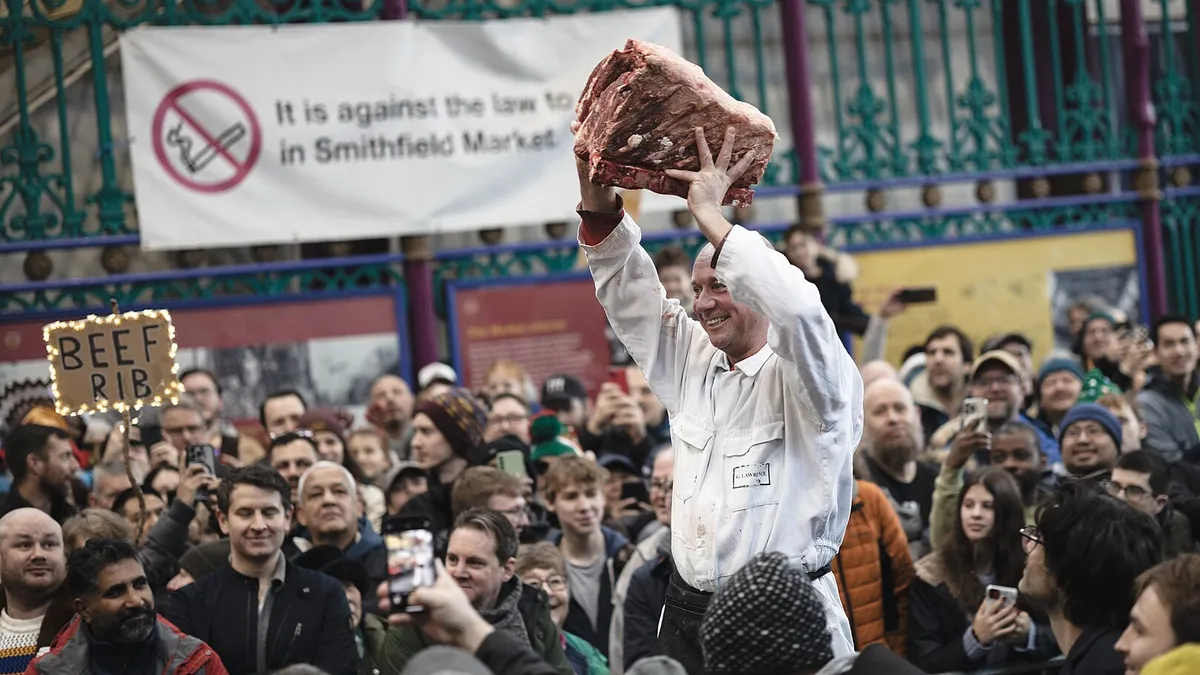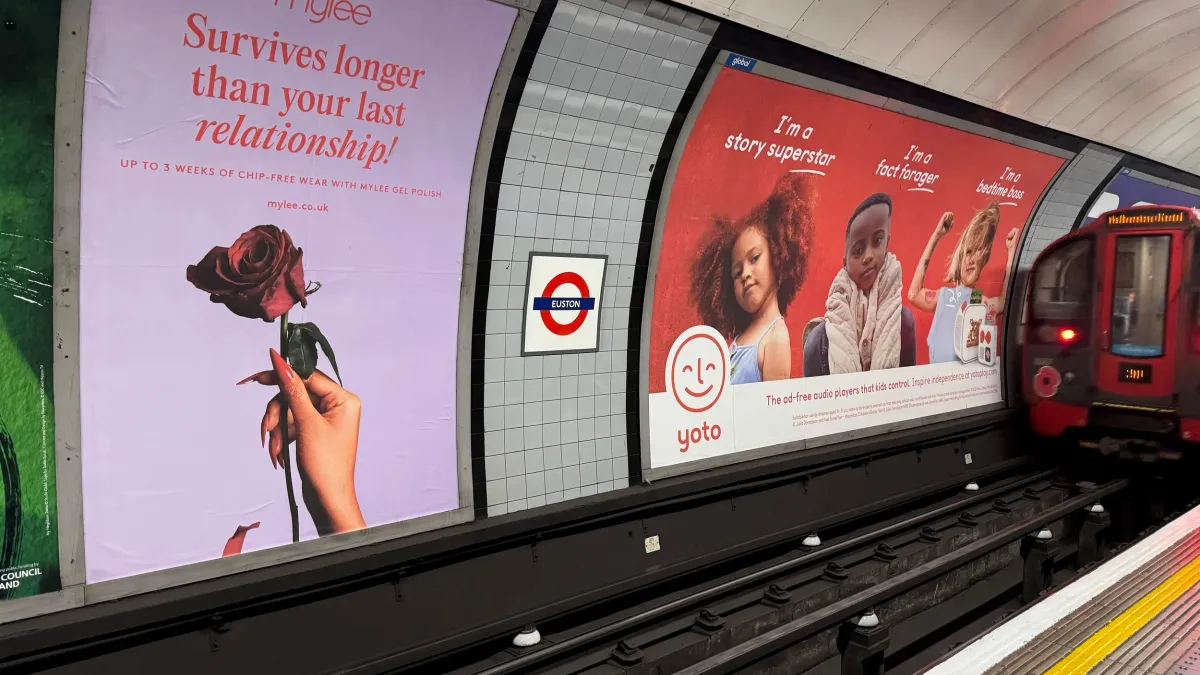
For a quarter of a century, the Art on the Underground program has seamlessly blended art with the daily commute, bringing culture into one of the busiest public transport systems in the world. Starting in 2000, the initiative has redefined public space, transforming London’s Tube stations into a sprawling gallery where contemporary artists showcase thought-provoking and diverse works.
From the beginning, the program was envisioned as a way to engage commuters with art that goes beyond traditional gallery walls. Today, as it celebrates its 25th anniversary, Art on the Underground is a pillar of London’s cultural landscape, providing a platform for both emerging and established artists. The works span various mediums, from murals and sculptures to photography and digital installations, creating a dynamic environment that reflects the ever-changing nature of the city itself.
Rita Keegan: The Fabric of Time (2024)

Poster for: Rita Keegan, 'The Fabric of Time', 2024. 40th pocket Tube map cover. Photo: Benedict Johnson. Image Source: Art on the Underground
Bringing Art to the Heart of London’s Commute
The London Underground serves millions daily, offering a unique platform for both brands and artists to engage with a diverse audience. The Art on the Underground program mirrors this diversity, showcasing works that reflect various cultures, histories, and social issues. By placing art in public spaces, the program invites commuters to interact with creativity during their daily routines, turning the Tube into a space for cultural exchange, reflection, and discussion.
Art’s Role in Shaping the Public Space
Art on the Underground has redefined public art, transforming the Tube into a dynamic cultural space. Starting with Kendra Haste’s Underground Safari (2000), the program has evolved to include ambitious projects like Jim Isermann’s Tube Wrap (2007), which turned an entire train into a moving artwork. Iconic works, such as Cindy Sherman’s billboard (2003) and Mark Wallinger’s Labyrinth (2013), highlight the innovative use of the Tube’s unique environment to create visually striking and thought-provoking pieces that often address social, political, and cultural themes.
Joy Gregory: A Taste of Home (2024)

Joy Gregory, 'A Taste of Home', 2024. Heathrow Terminal 4 Underground station. Photo: Thierry Bal Image Source: Art on the Underground
The Power of Art in Public Transportation
What makes Art on the Underground stand out is its commitment to public engagement. The program's diversity of artistic voices—ranging from emerging artists to established figures—ensures that all perspectives are represented, and every visitor to the Underground is offered something to reflect upon. Artworks have celebrated London’s rich history, like Mark Wallinger’s Labyrinth, which commemorated the 150th anniversary of the Underground, and others that respond to contemporary issues, such as the #LondonIsOpen campaign (2016), which celebrated London’s openness and internationalism in the wake of the EU referendum.
Jeremy Deller: Piccadilly Line Project (2009)

What is the City but the People?, Jeremy Deller. 2009 Photo: Daisy Hutchison. Image Source: Art on the Underground
#LondonIsOpen Campaign (2016)
David Shrigley, London: Everyone Welcome, 2016, Photograph: Thierry Bal. Image Source: Art on the Underground
my name is lettie eggsyrub (2018)

my name is lettie eggsyrub, Heather Phillipson, Gloucester Road station, 2018. Commissioned by Art on the Underground. Photo: G.G Archard, 2018. Image Source: Art on the Underground
Moreover, Art on the Underground doesn't just stay in the background; it invites interaction. Jeremy Deller’s Piccadilly Line Project (2009) was a direct collaboration with Tube drivers, incorporating their words and phrases into the art, while Heather Phillipson’s my name is lettie eggsyrub (2018-2019) turned the station into an immersive experience, combining video, sculpture, and sound. These participatory and immersive works engage commuters in ways that make art feel relevant and personal.
Celebrating London’s Diversity and History
London, a global city known for its diversity, is uniquely suited for art that reflects different experiences. Artists from all backgrounds—whether local or international—have used the Tube network to explore identity, migration, culture, and history. Joy Gregory’s A Taste of Home (2024) exemplifies this, using photographs, poetry, and botanical imagery to reflect on migration and memory, giving a voice to refugees and asylum seekers living near Heathrow. Similarly, Claudette Johnson’s Three Women (2024), a powerful exploration of Black femininity, continues the program’s tradition of challenging stereotypes and giving visibility to marginalized groups.
These works resonate deeply with commuters, many of whom may see their own experiences reflected in the art they encounter. Whether it’s through a historical lens or a contemporary one, the art displayed on the Underground speaks to the lived experiences of Londoners and visitors alike, highlighting the city’s dynamic cultural fabric.
The Future of Art on the Underground
As Art on the Underground enters its next phase, it remains committed to celebrating the city’s evolving identity while also giving artists the freedom to experiment and innovate. The program’s ability to adapt to technological advancements, like digital installations and interactive art, ensures that the Underground will continue to be an exciting place for art lovers and commuters alike.
For brands looking to reach a vast and diverse audience, the Tube offers an unparalleled opportunity. London Underground Advertising provides unique formats and platforms that allow your message to be seen by millions each day. Much like the art installations that enliven the Underground, your campaign can become a part of the fabric of the city, making an impact on both a local and global scale.
Claudette Johnson: Three Women (2024)
David Shrigley, London: Everyone Welcome, 2016, Photograph: Thierry Bal. Image Source: Art on the Underground
Conclusion: Art and Advertising in Harmony
As the Art on the Underground program celebrates its 25th year, it’s clear that art and public space can coexist in ways that enrich both the cultural landscape and everyday life. The stories told through these artworks, whether they explore identity, history, or societal issues, offer a window into the heart of London. For businesses and brands, this dynamic environment presents an opportunity to not only engage with a broad audience but to become a part of a legacy of creativity that defines London’s public spaces.
Get in touch with London Underground Advertising today to explore how you can leverage the iconic Tube network to elevate your brand's presence in one of the world’s busiest transport systems.
Latest News
07 Mar 2025 · 3 minute read
by Penny Hargreaves
Golden Rules for Advertising in the London Tube: Maximise Your Impact
15 Dec 2025 · 4 minute read
by Penny Hargreaves
Smithfield Market Christmas Eve Auction and a Proper London Tradition
17 Sep 2025 · 3 minute read
by Lilly Ashford
Your Guide to Targeting Different Audience Segments on the Tube
Our Valuable Clients, Past and Present
Schedule a call
Pick a date and time for a call that suits you.
We can go through all the available format options and any other questions you have about successfully launching your next advertising campaign.
Launch Your Tube Campaign Today!
Get your brand in front of millions of Londoners and tourists as they move through the city. Just fill in your details on the form to advertise on the London Underground and our expert team will be in touch to kickstart your journey towards standout, high-impact results.
Join thousands of brands that stand out and connect with the transport network’s users.




















